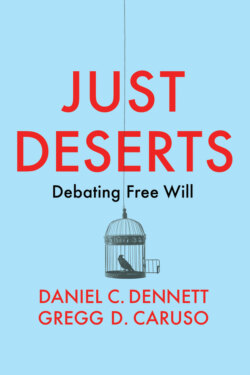Just Deserts

Реклама. ООО «ЛитРес», ИНН: 7719571260.
Оглавление
Daniel C. Dennett. Just Deserts
CONTENTS
Guide
Pages
Just Deserts. Debating Free Will
Foreword
Preface
Introduction
List of Useful Definitions
Exchange 1 Debating Free Will and Moral Responsibility
Coda: On Determinism
Exchange 2 Going Deeper: The Arguments
The Arguments for Free Will Skepticism
Debating the Manipulation Argument
Debating the Charge of Instrumentalism
Debating Luck (Again)
Exchange 3 Punishment, Morality, and Desert
The Public Health–Quarantine Model
Objections and Replies
Punishment, Morality, and Deterrence
Debating Desert and Compatibilism: One Final Time
References and Suggested Readings
Index. A
B
C
D
E
F
G
H
I
J
K
L
M
N
O
P
R
S
T
V
W
Y
Z
POLITY END USER LICENSE AGREEMENT
Отрывок из книги
“Just Deserts is a delight: a sharp and interesting discussion of punishment, morality, choice, and much else. It hits the sweet spot; it’s wonderfully clear and accessible – perfect for a newcomer to the free will debates – but also deep and subtle, with plenty to engage experts in the field.”
Paul Bloom, Brooks and Suzanne Ragen Professor of Psychology, Yale University, and author of Against Empathy
.....
Now, in fairness, you do provide a forward-looking justification for backward-looking blame and punishment. That is, you argue that the whole moral responsibility system is justified in terms of its forward-looking benefits, but once we adopt the “system of desert” we need to reject case-by-case judgments of what would produce the best outcomes. Internal to the system, you maintain, we need to adopt backward-looking, desert-based practices and policies. But I see at least two problems with this. First, it’s an open question whether the moral responsibility system has the forward-looking benefits you maintain. The notion of just deserts, for instance, is too often used to justify punitive excess in criminal justice, to encourage treating people in severe and demeaning ways, and to excuse and perpetuate social and economic inequalities. Additionally, resentment, indignation, moral anger, and blame are often counterproductive on the interpersonal level when it comes to the goals of safety, moral formation, and reconciliation.
Rather than argue the point further here, however, I will simply note that it remains an empirical question whether, on balance, we would be better off without a system of desert. I believe we would be. My second concern is that blame and punishment, especially legal punishment, can cause severe harm. If you want to justify the harm caused by blame and punishment on the assumption that agents are free and morally responsible, hence justly deserve to suffer for the wrongs they have done, then it would seem you need good epistemic reasons for thinking agents actually are free and morally responsible in the sense required. But I don’t see how a pragmatic or consequentialist justification of the “whole system of desert” can provide such a justification. Pointing to the benefits of adopting a system of desert seems orthogonal to the core question.
.....